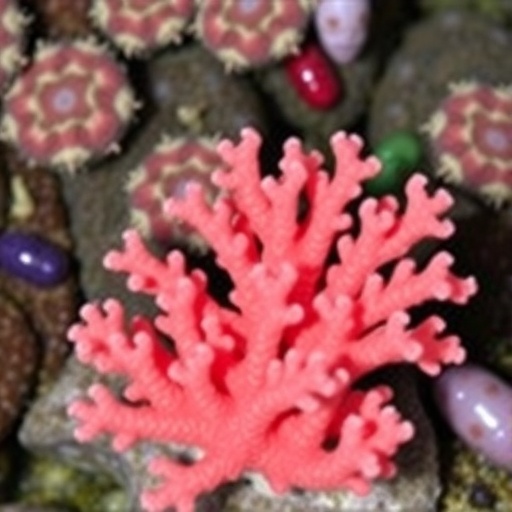Recent research has illuminated the intricate relationship between coral reefs and their symbiotic partners as climate change continues to pose a significant threat to marine ecosystems. The work of Cavailles, Kuzmics, and Grube delves into the dynamics of these symbiotic relationships under fluctuating temperature conditions, highlighting the resilience and adaptability of coral systems. The findings underline the importance of understanding these interactions for the future conservation and management of coral reefs.
Corals, often referred to as the rainforests of the sea, are home to diverse marine life and play a crucial role in the health of our oceans. Their survival hinges on a symbiotic relationship with zooxanthellae, photosynthetic algae that reside within their tissues. This partnership not only provides corals with essential nutrients but also contributes to the vibrant colors that characterize many reef systems. However, as rising temperatures disrupt this balance, the consequences for coral health and, by extension, marine biodiversity, can be dire.
In their study, Cavailles and colleagues utilized advanced methodologies to investigate how temperature variations affect the symbiotic dynamics of coral reefs. By simulating future temperature scenarios projected under climate change models, the researchers observed shifts in algal populations within coral hosts. These findings reveal that while some corals exhibit resilience and maintain their associations with these algae, others show signs of degradation and potential bleaching, which poses a threat to the survival of coral species.
The research also examined the mechanisms behind these responses, shedding light on how some coral species can regulate their symbionts in order to cope with thermal stress. This regulation is crucial, as it determines the overall health and viability of coral reefs facing temperature-induced stress. The authors emphasized that understanding these regulatory processes is vital for predicting how different coral species will respond to ongoing climate change.
A significant aspect of the study was the exploration of the genetic and physiological adaptations within coral and symbiont populations. By analyzing gene expression patterns in response to thermal stress, the team identified specific pathways that corals engage in to mitigate the impact of elevated temperatures. These insights provide a foundation for future research into genetic resilience, which could be harnessed for conservation strategies aimed at enhancing coral survival.
The ongoing decline of coral reefs, devastations exacerbated by climate change, extends beyond the corals themselves. The loss of reef structures impacts the myriad of species that depend on these ecosystems, leading to a cascading effect that jeopardizes marine biodiversity. Therefore, the implications of this research are profound, urging a collective response to address climate change and safeguard these habitats.
Equally important, the findings of this study contribute to the broader understanding of marine ecosystem dynamics. By examining the interplay between environmental stressors and biological responses, the researchers are laying the groundwork for innovative approaches to coral reef conservation. This work underscores the necessity for urgent action in mitigating climate change and preserving biological diversity in our oceans.
The study serves as a clarion call to both the scientific community and policymakers, highlighting the urgent need for effective management strategies that promote coral resilience. With coral bleaching events occurring more frequently and intensely, the researchers advocate for the integration of ecological research into conservation practices. By adopting more sustainable practices, including reducing carbon emissions and protecting marine habitats, there is an opportunity to bolster the resilience of coral reefs worldwide.
In summary, the dynamic interplay between corals and their symbiotic algae under climate change conditions represents a critical area of study. Cavailles, Kuzmics, and Grube’s research offers vital insights that pave the way for enhanced understanding and preservation efforts. As the planet continues to warm, the actions we take now will significantly influence the future health of coral ecosystems.
The authors call upon both scientists and environmental advocates to disseminate these findings widely, fostering a deeper awareness of the challenges faced by coral reefs. Education and outreach play a crucial role in galvanizing public support for policies aimed at protecting these vital ecosystems. Through increased advocacy and collaborative efforts, there is hope for the future of coral reefs and the diverse marine life that relies on them.
In conclusion, the profound relationship between corals and their symbiotic partners underlines the complexity of marine ecosystems. As research continues to uncover the intricacies of these relationships, it becomes all the more critical to prioritize the health of coral reefs. The need for immediate and concerted action against climate change has never been more urgent, and the findings of Cavailles, Kuzmics, and Grube present an unwavering case for collaboration and innovation in marine conservation efforts.
Subject of Research: Coral-Symbiont Relationships under Climate Change
Article Title: Symbiont dynamics and coral regulation under changing temperatures
Article References: Cavailles, J., Kuzmics, C. & Grube, M. Symbiont dynamics and coral regulation under changing temperatures. Coral Reefs 44, 1107–1126 (2025). https://doi.org/10.1007/s00338-025-02667-0
Image Credits: AI Generated
DOI: https://doi.org/10.1007/s00338-025-02667-0
Keywords: Coral reefs, symbiosis, climate change, thermal stress, biodiversity, marine conservation, resilience, algae, zooxanthellae, environmental stress, gene expression, ecosystem dynamics.




